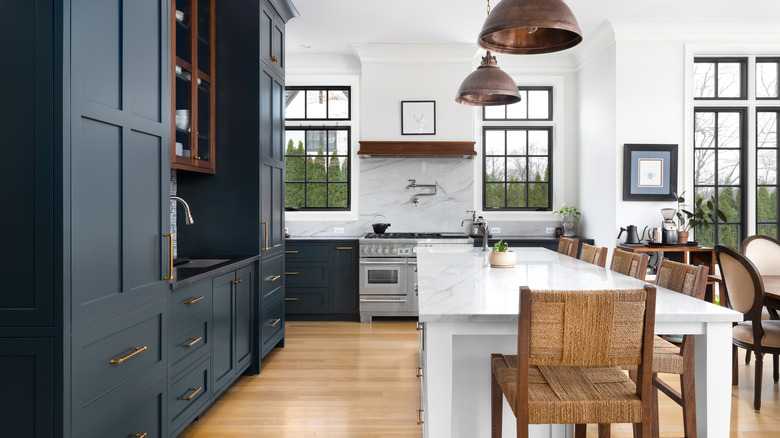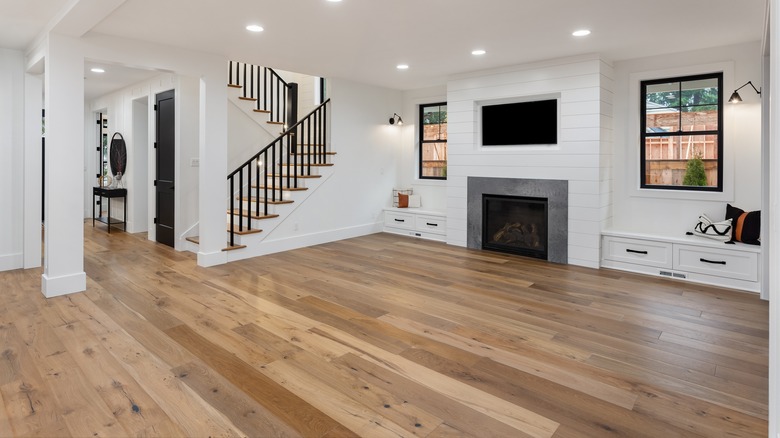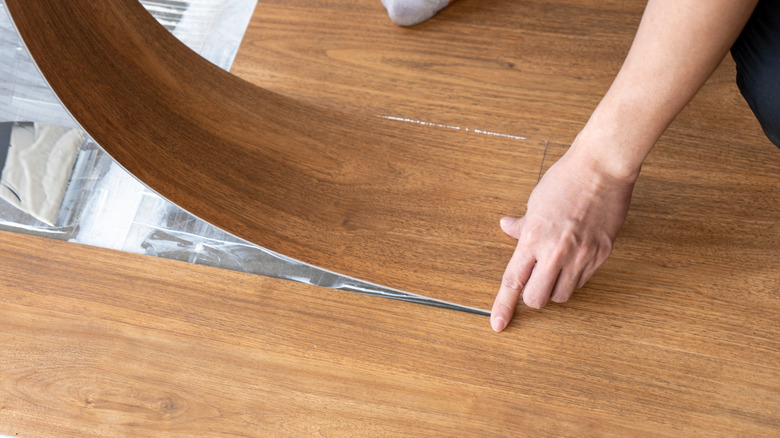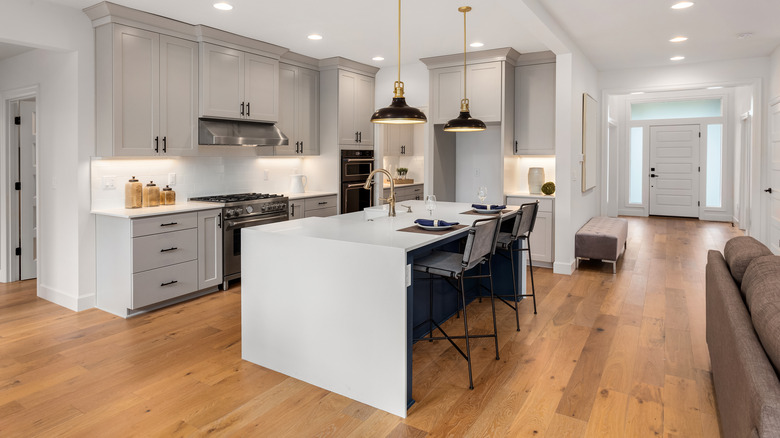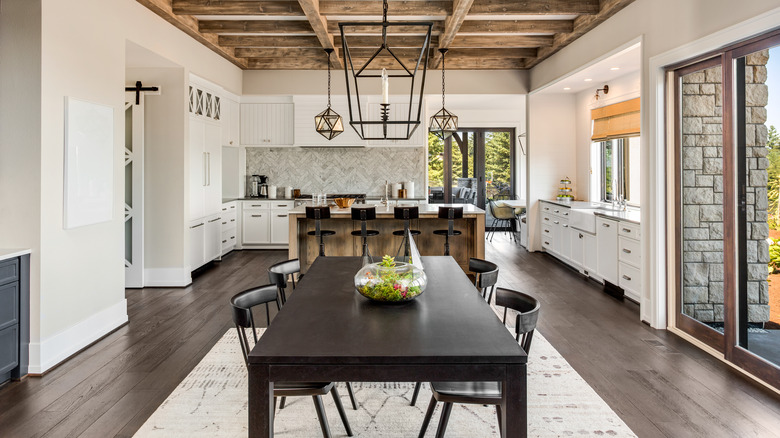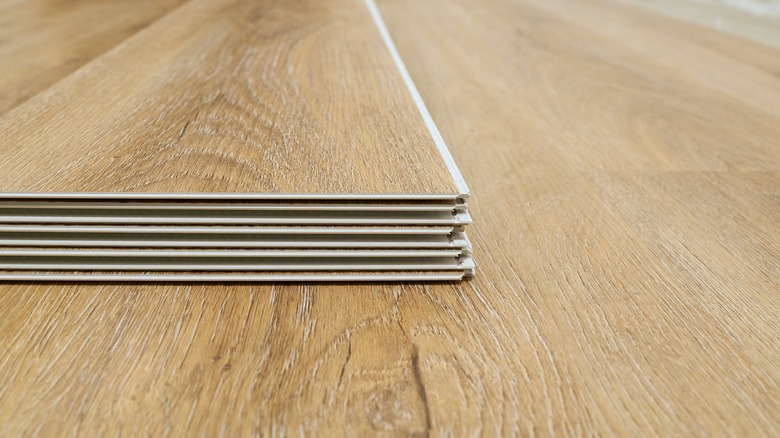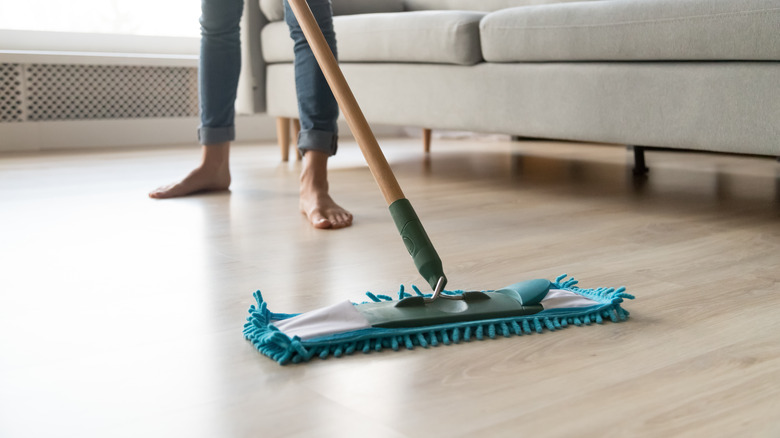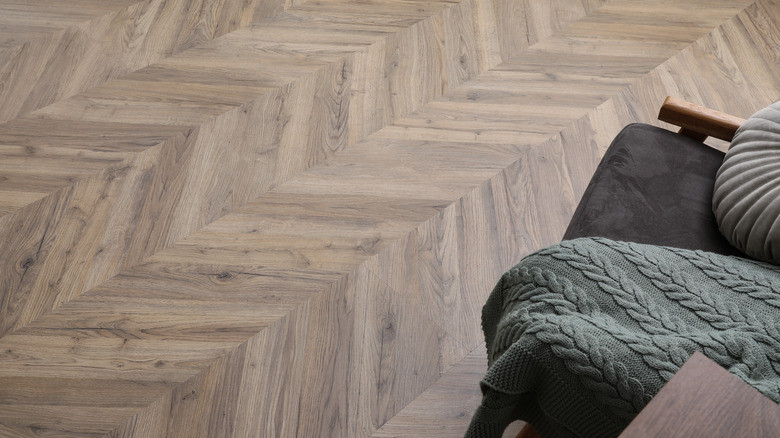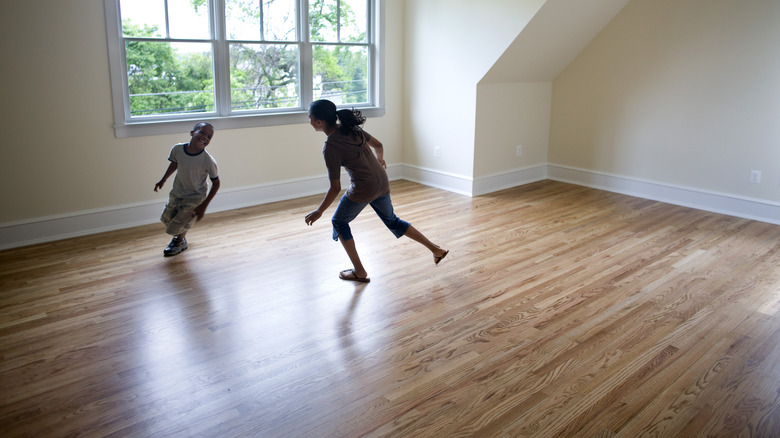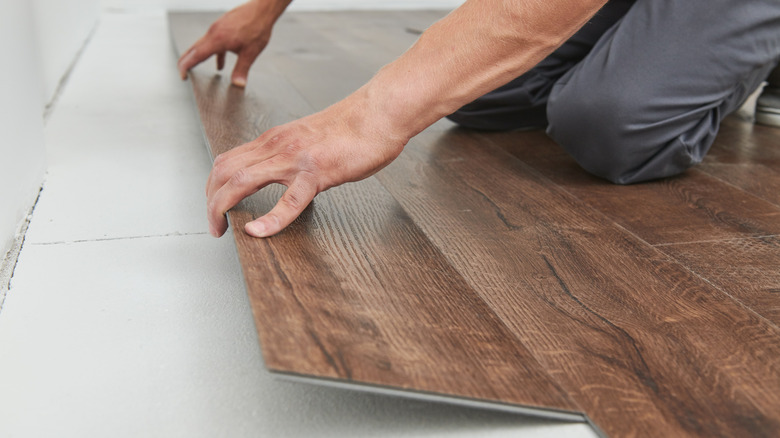Wood Floors Vs Vinyl Plank: Pros And Cons Of Both
Wood flooring has been around for centuries to showcase elegance while maintaining practicality. However, over the years, there has been some debate on whether real hardwood flooring is the better option for your home or if vinyl flooring has stolen center stage. There are certainly pros and cons of both hardwood flooring and vinyl flooring, but everyone's style, budget, and preferences are different.
For example, hardwood flooring lasts forever but can be extremely costly due, in part, to its availability, per Household Advice. With vinyl flooring, you aren't spending as much per square foot; however, you might not get as many years out of it as you would with traditional hardwood. Choosing the right flooring for your space can be daunting, especially with so many options on the market today. But that's why we're here to help! Keep reading to find out more about how hardwood and vinyl flooring compare.
Hardwood floors last longer than vinyl
As with almost anything, the better you care for something, the longer it will last. The same can be true for flooring. A huge reason wood flooring lasts so long could be its price. The more expensive something is, the better care we tend to give it. The same can be said for the maintenance of our floors.
Hardwood floors also have the advantage of being made from natural wood, which means they will be thick and durable. However, they will need to be refinished around half a dozen times over their lifespan. But with the proper care and maintenance, Nature Wood Floors says that hardwood floors can last up to 100 years, making them a great investment.
Typically, vinyl flooring doesn't have the same lifespan as real hardwood floors. However, according to Pro! Flooring Brokers, vinyl flooring can be made to mimic hardwood floors and, because of this, can contain thicker planks of wood, making them last up to 30 years. There are also thinner planks which will typically last you a little over half a decade. But with the proper maintenance and care, vinyl flooring can have a generous lifespan.
Vinyl floors are more durable than hardwood (in terms of day to day use)
Typically, vinyl flooring is more durable in terms of day-to-day use since most types of vinyl flooring are coated with a protective layer to help against stains, spills, and scratches, as per All About Materials. While it isn't 100% scratch-proof, your vinyl flooring isn't as likely to succumb to dents or chipping. Plus, vinyl flooring, unlike hardwood flooring, is waterproof. That means it is a great choice for potty-training pets or people living in humid climates.
While solid hardwood is durable due to its longevity, the sheer variety of woods makes the durability more inconsistent than vinyl. Vinyl flooring is comprised of multiple layers, whereas solid hardwood flooring is only made up of one layer: wood. This one layer, while solid wood, makes it more vulnerable to damage, especially softer natural woods like red cedar, per Flooring America. That means it requires much more maintenance than vinyl in day-to-day use.
Hardwood floors can add more value to your home than vinyl
Hardwood has a higher ROI than vinyl, and there are a few reasons people might be more inclined to pay a higher price for a home with hardwood. The ROI for wood is 70 to 80%, and it can increase your house's worth by 2.5%. You can't beat those kinds of numbers. Black Forest Floors mentions that its overall look and longevity are huge factors in its popularity. They look elegant no matter their stain color and suit a bevy of different interior designs, making the house move-in ready.
Plus, having brand-new or even semi-new hardwood flooring in your home indicates to the buyer that they won't need to remodel first to make the house liveable, saving them thousands of dollars in installation costs and the headache of remodeling. While vinyl flooring can certainly look nice and will definitely get you a higher ROI than carpet or tile (per Realtor), nothing beats the look and feel of the real thing.
Hardwood flooring can be altered if you change your style
One of the best parts about owning hardwood flooring is you can change it up! You can refinish your hardwood floors by staining, sanding, or painting them to help give your home a fresh feel. Woodworking Clarity suggests that the most common types of stains or finishes are varnish finishes or oil-based, water-based, gel, or lacquer stains. There are also water-soluble dye stains and metal-complex dye stains. The color of your floors will also help determine the ambiance of your home, so it's important to take your time and decide what style is best for your floors.
While it is possible to refinish different types of vinyl flooring, you have a longer lifespan with hardwood floors. This means you'll be able to refinish them more times due to their dense state. Most people can refinish their hardwood floors around 10 times in their lifespan. Vinyl floors can either be painted a new color or stained, though some won't take a new stain if they have a protective coating sealing them (via Remodel or Move). Additionally, not all home improvement experts agree on whether or not you can stain or paint vinyl planks, meaning you might not get the best results if you try the DIY. If you're prone to switching your style up often, hardwood floors might be a better option.
Vinyl is more affordable than hardwood
The cost will vary depending on the size of your space, how much flooring you need, and even the style of vinyl flooring you choose. Add an installation fee (if you decide not to go the DIY route), and the price will increase. However, compared to the average hardwood flooring cost of around $6 to $12 per square foot, vinyl flooring is much cheaper at an average of about $3 per square foot (via Flooring Clarity).
If you want nice-looking floors for a fraction of the cost, then vinyl flooring might be the best path to take. And since vinyl flooring mimics natural hardwood flooring, most of your guests won't even notice the difference. If you're planning on enlisting some help for the installation process, your price will increase; however, a considerable upside to vinyl flooring is that most people can opt to go the DIY route. Because the cost of the product is cheaper and it's easy to install without professional help, vinyl flooring comes out on top when it comes to affordability.
Vinyl flooring requires less maintenance than hardwood
Most vinyl flooring is stain and water-resistant, meaning you won't have to spend nearly as much time or money maintaining your floors as you would with real hardwood. Sweeping or dusting your floors is enough maintenance to keep them looking their best, and because of their resistance to moisture, you can also use a mop to get rid of extra dirt or debris. When it comes to floor maintenance, vinyl flooring is one of the easiest to maintain on the market, per The Knowledge Burrow.
When it comes to cleaning and maintaining hardwood floors, much more maintenance is required. For example, traditional mopping isn't always ideal for hardwood because it can cause water damage and warping. Instead, using a specialized detergent or polisher is key, as per American Home Shield. When you think about dusting and sweeping daily, specialized mopping monthly, a deep clean every few months, and a full-on refinish every few years, you're talking a lot more maintenance, care, and money going into maintaining hardwood floors as opposed to vinyl.
Vinyl is more modern than hardwood
Everyone's style is different. Some people prefer a more traditional feel, whereas others like a more modern aesthetic. In terms of "trends," vinyl flooring is more modern. According to Z Net Flooring, vinyl didn't make an appearance in the United States until the 1930s, and it would hit its stride in popularity as a flooring option decades later in the 1960s. Since then, vinyl flooring has changed exponentially in design, colors, patterns, and style.
If you prefer gray flooring and wide planks, vinyl is the way to go. You can also choose a bleached driftwood option that would be difficult to source via natural hardwood, or a blue-tined wooden plank option that would look great in industrial rooms. You have a lot more creative license with vinyl since it's manufactured, allowing you to dive into more creative trends than hardwood would allow.
Vinyl flooring is less noisy than hardwood
If you or your family is blessed with musical talent, then hardwood flooring might be a better option due to its astounding acoustics. T&G Flooring mentions that solid hardwood flooring has an amazing acoustic sound due to its hardness. This hardness, which can be measured using the Janka Scale, is what helps distribute the sound more evenly throughout a space. Similarly, if you enjoy a rich reverberation, solid hardwood helps to produce the best echo effect. This might be perfect for musical families or those who don't mind louder noises.
Vinyl flooring, on the other hand, absorbs noise. According to Acoustical Surfaces, vinyl flooring is excellent at muffling or softening noises associated with walking or playing. Vinyl flooring isn't solid wood, so it sits atop a softer underlayer that helps to reduce noise. This is perfect for homes with many people, high-energy kids running around, or ones with pets.
If you like your space quieter, vinyl flooring is a great choice to minimize sound. However, hardwood flooring might be right up your alley if you don't mind the extra noise or enjoy a richer-sounding acoustic to your space.
Vinyl flooring is easier to install than hardwood flooring
When it comes to installation, vinyl flooring is one of the easiest to install, per Flooring America. To lay down the vinyl, you need to level your subfloor, tape down your underlayment, apply an adhesive, and lay down different sections of your vinyl plank-by-plank, according to Dumpsters.com.
While vinyl flooring is one of the easiest to install, hardwood flooring comes out on the opposite end as one of the most difficult. It's significantly more difficult due to having to nail down each plank. While you can still use a glue adhesive for solid hardwood flooring, the most common process is nailing the planks down, per The Marmoleum Store. In fact, Carpet and Rug World mentions that it is the fastest and most inexpensive way to put down flooring and ensures your wood planks are securely fastened to the subfloor. Since most people are inexperienced when it comes to installing hardwood, it's a good idea to call in the professionals. However, this will increase the installation cost and make the entire process a bit pricier.
